Fiverr vs Upwork - Which to Choose?
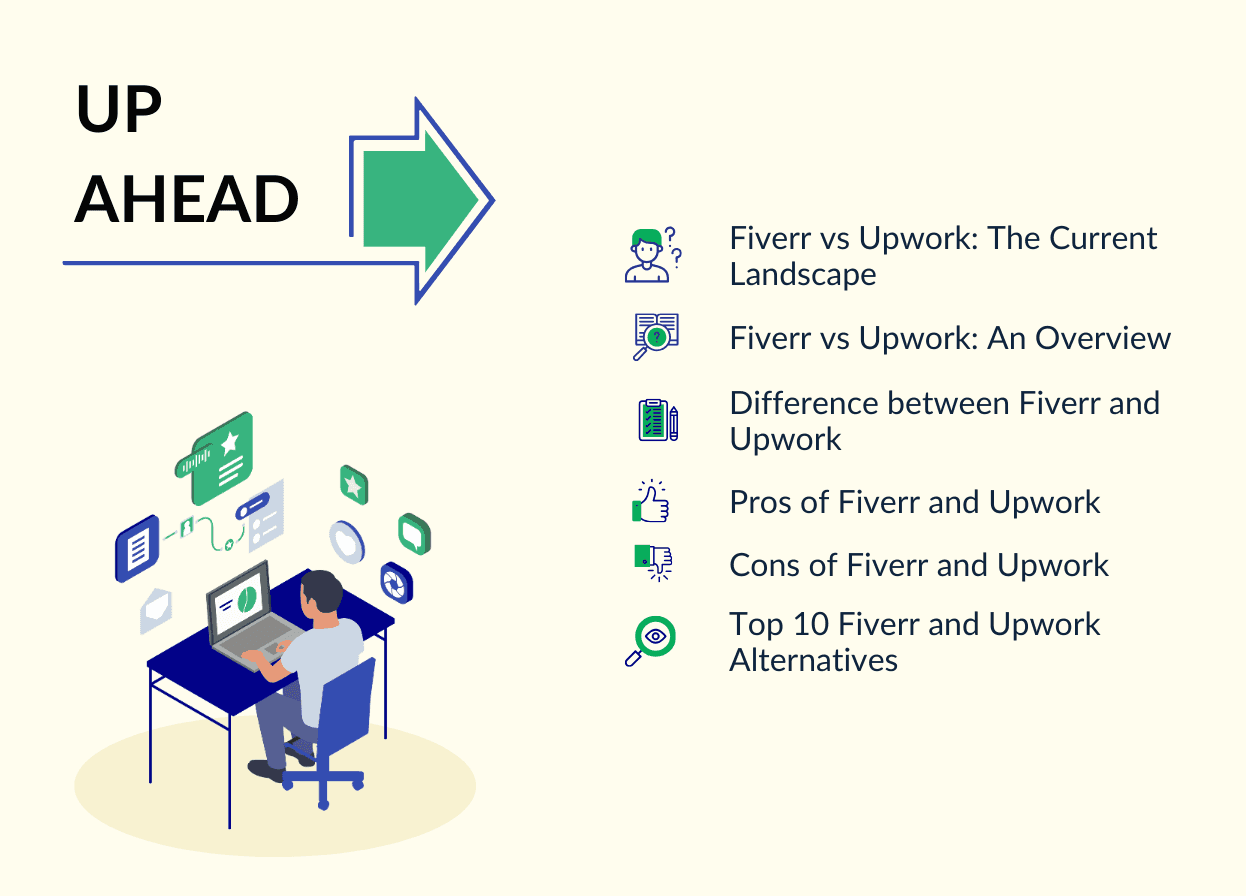

Freelancers and businesses are turning to platforms like Fiverr and Upwork to connect, collaborate, and thrive. However, with a higher supply of experienced professionals looking for work, these platforms have become highly competitive. Which one should you choose?
In this blog, you will find the intricacies of these platforms, exploring their impact on the freelance ecosystem and providing insights into their prevailing saturation.
Fiverr vs Upwork: The Current Landscape
According to a 2020 report, at least 2 million people officially joined the freelance workforce. As the gig economy expands, the Fiverr vs Upwork battle has reached new peaks.
According to companies' 2022 annual earnings reports, Upwork has 827,000 active buyers, and Fiverr has 4.3 million active buyers, which means the volume of opportunities on Fiverr is more than on Upwork. Simultaneously, the number of registered freelancers on Upwork and Fiverr has skyrocketed.
It is becoming more challenging for individuals aiming to secure clients and build sustainable freelance careers. Winning through this saturation requires a strategic approach and a keen understanding of the evolving dynamics of the freelance market.
Fiverr vs Upwork: An Overview
Online platforms like Fiverr and Upwork serve as the connecting bridge between freelancers and clients, operating with distinct business models. Fiverr, known for its "gig" structure, allows freelancers to showcase specific services, while Upwork is a comprehensive marketplace for various skills and projects.
Both platforms boast diverse services from graphic design and writing to programming and marketing.
Difference between Fiverr and Upwork
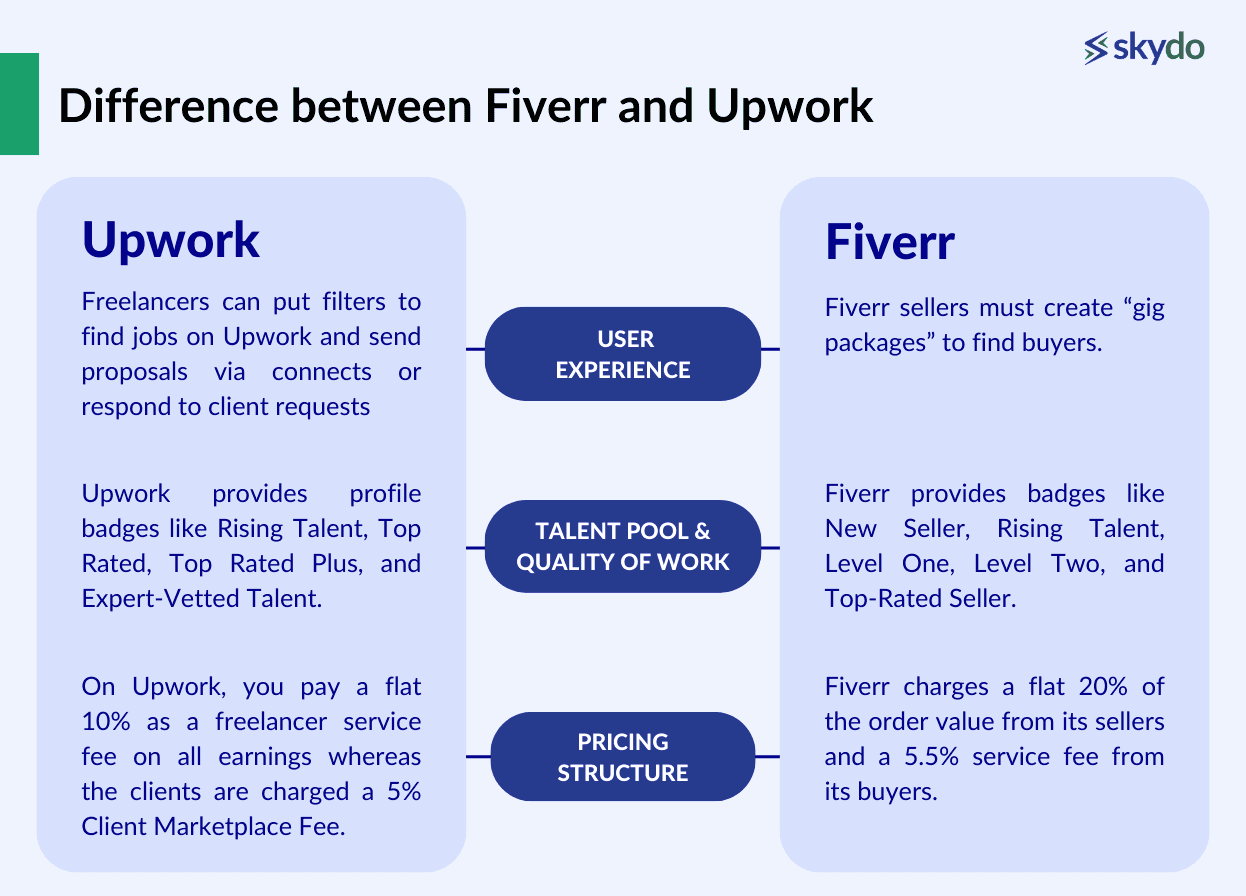
#1: User Experience
The user experience and interface of Fiverr and Upwork play a crucial role in attracting and retaining users. Service providers are called freelancers on Upwork and sellers on Fiverr whereas the service seekers are called clients and buyers.
Freelancers can put filters to find jobs on Upwork and send proposals via connects or respond to client requests. However, Fiverr sellers must create “gig packages” to find buyers.
#2: Talent Pool and Quality of Work
The vetting process of both Upwork and Fiverr is confusing and there is no one-fit-for-all answer on how these platforms accept freelancer profiles. A freelancer with a 3-year work experience on Upwork might not be accepted at all on Fiverr for reasons unknown.
However, once accepted, you can receive profile badges based on the quality of your work. Upwork provides profile badges like Rising Talent, Top Rated, Top Rated Plus, and Expert-Vetted Talent.
Fiverr provides badges like New Seller, Rising Talent, Level One, Level Two, and Top-Rated Seller. These badges help clients or buyers find the right freelancer.
#3: Pricing Structure
Understanding the pricing structures adopted by Fiverr and Upwork is essential for freelancers looking to optimise their earnings.
One of the most crucial advantages of freelancing on these platforms is that the payments are nearly hassle-free as they operate on escrow services. In escrow services, these online platforms take payment from the client at the start of work and hold it in an escrow account until both parties have agreed that the contract is fulfilled, at which point the funds are released to the service provider or a freelancer.
On Upwork, you pay a flat 10% as a freelancer service fee on all earnings whereas the clients are charged a 5% Client Marketplace Fee. Fiverr charges a flat 20% of the order value from its sellers and a 5.5% service fee from its buyers.
Pros and Cons of Fiverr and Upwork
Let’s explore the strengths and weaknesses of Fiverr and Upwork.
Pros of Fiverr and Upwork
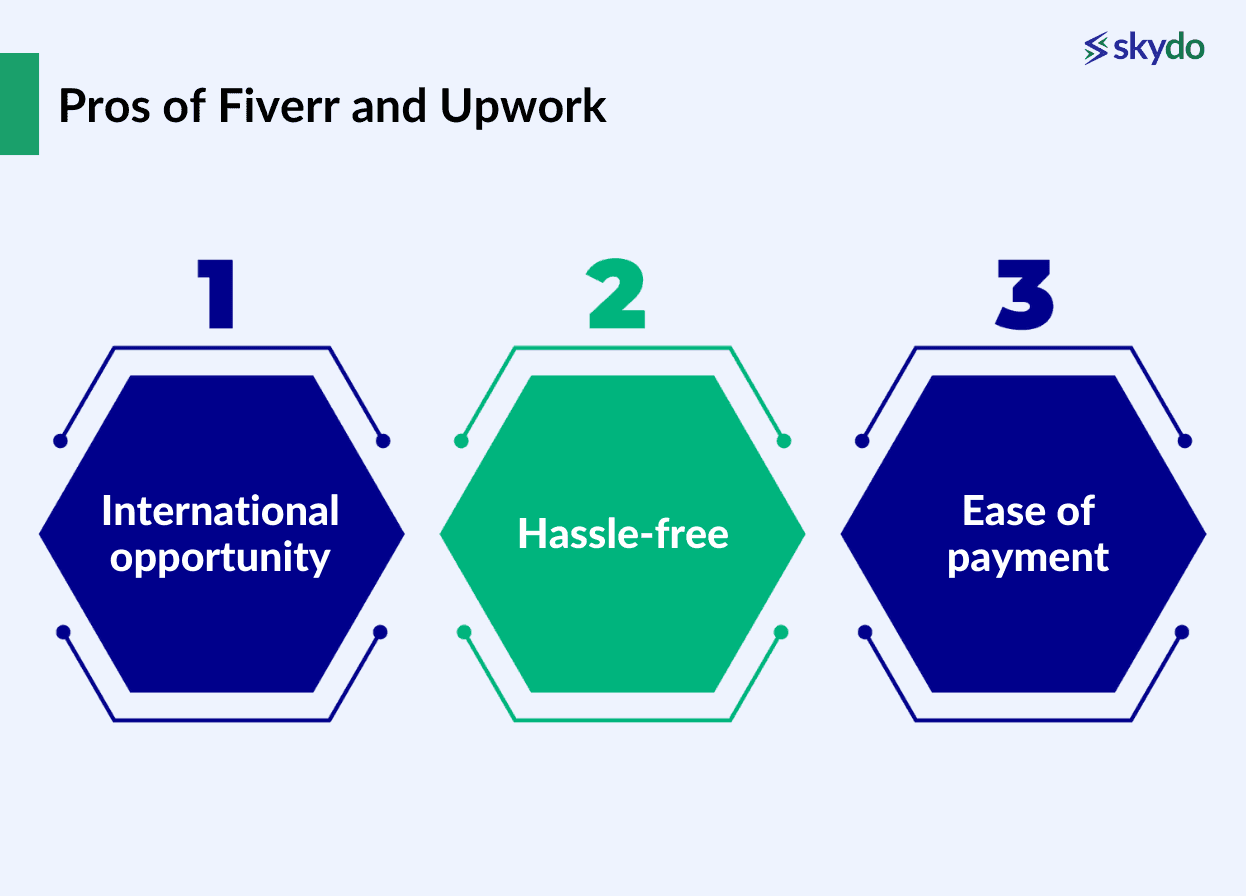
- International opportunity
Professionals can get international exposure from home and earn in dollars. It especially acts as a boon to developing countries like India, Pakistan, Bangladesh, and the like.
- Hassle-free
Upwork provides freelancers with a direction for finding jobs with its various filters. Freelancers don’t have to struggle with how to find a relevant opportunity.
- Ease of payment
Unlike freelancers who work independently, without any help from online platforms, freelancers on Upwork or Fiverr do not have to worry about the payment cycle as they use an escrow system.
Cons of Fiverr and Upwork
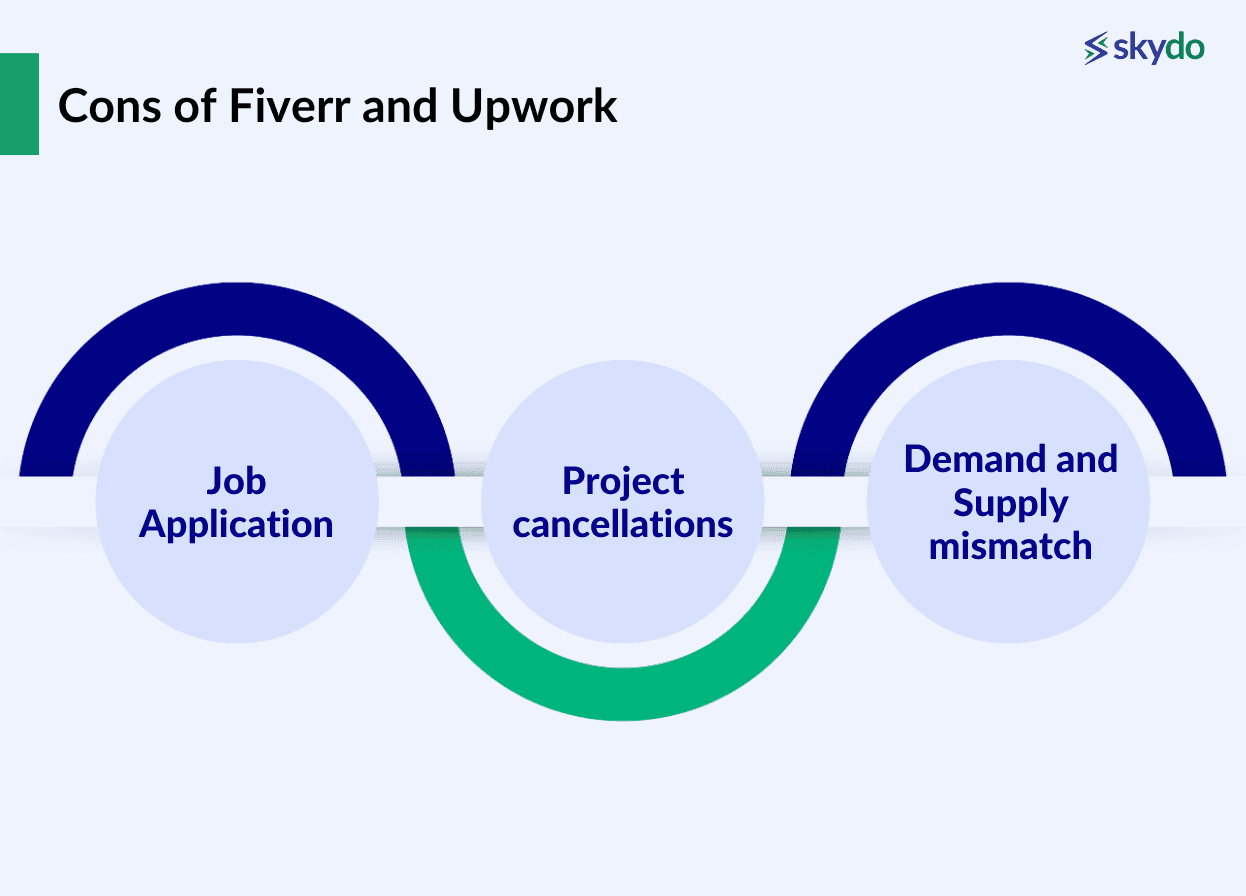
- Job Application
On Upwork, you need to use Connects to send proposals to your potential clients.
According to a top-rated freelancer on Upwork who chooses to be anonymous, one project proposal can cost you anywhere between $2.25 to $15 with no guarantee of getting it. Assuming an average freelancer bags 1 out of 10 jobs they apply for, they must spend at least $22.5.
On Fiverr, you cannot apply for jobs as a freelancer rather you need to create “gigs” to let a buyer buy from you.
- Project cancellations
Within the Project Catalog on Upwork, both parties have a 24-hour window to cancel an order without facing any penalties. On Fiverr, it’s not quite as easy to change the direction of a Gig once it’s been purchased. All Gig cancellations can result in a reduction in a seller’s rating, even if the buyer made the cancellation.
- Demand and Supply mismatch
Recently, freelancers have been facing a sense of saturation on online freelancing platforms. This is because of the demand and supply mismatch on such platforms. For example, Upwork has ~18 million registered freelancers but only 145,000 clients.
Top 10 Fiverr and Upwork Alternatives
For freelancers seeking diverse opportunities, you can check out alternatives such as
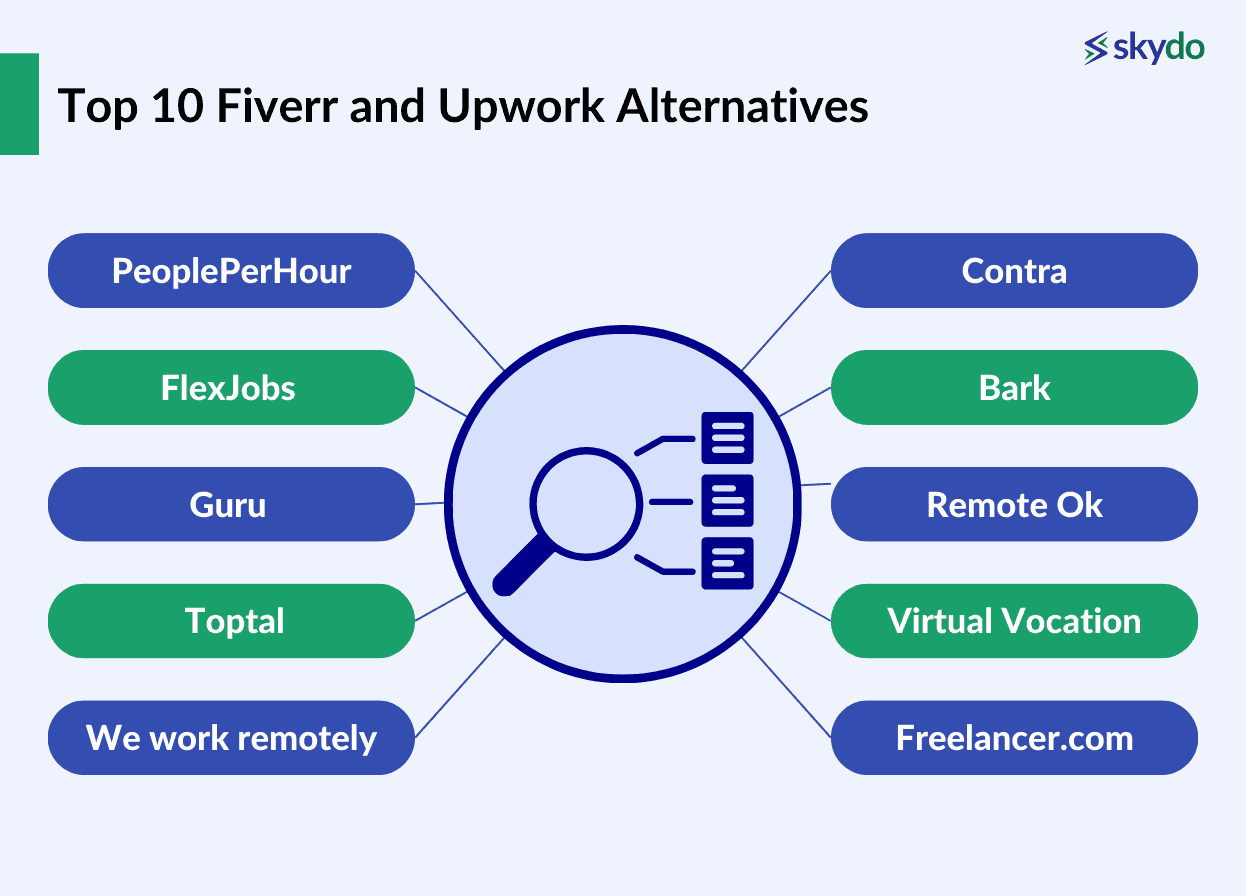
1. PeoplePerHour
An online platform connecting freelancers with businesses in various fields. Freelancers in areas such as writing, design, programming, marketing, and other creative and technical fields can explore it.
2. FlexJobs
A job platform that focuses on remote and flexible job opportunities. It caters to individuals seeking flexible and remote job opportunities across various industries.
3. Guru
A secure, flexible and cost-effective platform to find and hire expert freelancers. Top skills include programming & development, writing & translation, design & arts among many more.
4. Toptal
Toptal is a marketplace for top freelancers in software development, design, and finance. It is known for connecting clients with highly skilled professionals.
5. We work remotely
We Work Remotely is a job board exclusively for remote job opportunities. It covers a wide range of industries and professions.
6. Contra
Contra is a platform that connects freelancers with startups for project-based work. It aims to build long-term relationships between freelancers and clients. It is ideal for freelancers interested in project-based work with startups.
7. Bark
Bark is a revolutionary way for local service providers and professionals to find jobs. This is best for professionals providing services in the home, garden, health, well-being, weddings & events among others.
8. Remote Ok
Remote OK is a job board specifically focused on remote job opportunities across various industries.
9. Virtual Vocation
A job board that helps you find legitimate remote jobs quickly, easily and safely. It caters to a wide range of professions.
10. Freelancer.com
It claims to be the world’s largest freelancing and crowdsourcing marketplace by number of users and projects. It connects over 71,212,893 employers and freelancers of almost all domains globally from over 247 countries, regions and territories.
Conclusion
With the increasing popularity of freelancing jobs, the pricing structure of platforms like Upwork and Fiverr is adding up to saturation.
However, Upwork has easier acceptance for freelance profiles than Fiverr even though it costs freelancers money in the form of Connects. With the latest connect updates, it is becoming more difficult for serious professionals to get clients. Fiverr on the other hand, is more difficult to crack than Upwork.
It is better to try alternatives to these online platforms as well as have other avenues to onboard clients instead of depending on third-party platforms.
FAQs
Q1. What are the other Fiverr and Upwork alternatives?
Ans: You can explore alternatives like PeoplePerHour, FlexJobs, Guru, and Toptal, We work remotely.
Q2. Which site is better than Upwork?
Ans: The choice between Fiverr and Upwork depends on individual needs. Alternatives like Toptal and Freelancer.com may offer different dynamics.
Q3. What is the best platform to start freelancing?
Ans: Fiverr and Upwork are excellent starting points, but exploring alternatives like FlexJobs or Guru can provide tailored opportunities.
Q4. What is the best way to become a freelancer?
Ans: You can start your freelance journey by identifying your skills, creating a compelling profile on platforms like Fiverr or Upwork, and gradually expanding to other specialised platforms based on your expertise and market demand.












